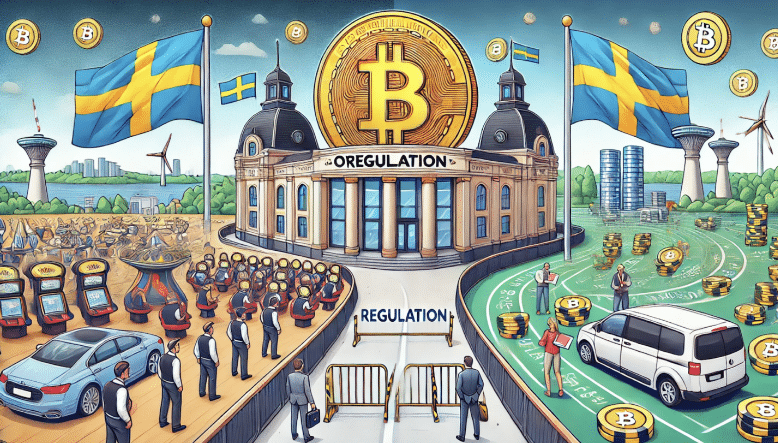Is Overregulation Driving Swedish Players To Bitcoin Casinos?

Spelinspektionen, the Swedish Gambling Authority, has come under fire recently for its mishandling of the country’s licensed gambling business. What was once seen as a shining light by Scandinavian and European countries looking to create their own regulated gambling frameworks is now bordering on being a cautionary tale of the dangers of hubris.
In this article, we will discuss how this once prospering online casino jurisdiction has fallen from grace, some of its more controversial decisions, and how this could see the adoption of cryptocurrencies like Bitcoin, Ethereum, and Solana gain traction with Swedish players.
High Praise for Swedish Reregulation
Due to its rich history of gambling, with documented games of chance prevalent in the country as far back as the 11th century, the Swedish government installed a state-run monopoly in 1934 to protect citizens from unlicensed gambling houses.
However, with the global nature of the internet and the proven success of licensed online casinos and betting frameworks in countries like the United Kingdom, Sweden began the slow process of revising its Gambling Act to allow for licensed international online casinos to operate in the region legally.
It would not be until 2019 when the country would officially open its doors to licensed gambling operators, with the framework they had put in place receiving high praise from local and foreign industry pundits.
Swedish Gamblers Reap the Rewards
The reason for this positive reception was due to how the government, and by extension, the Swedish Gambling Authority, had ensured that the revised Gambling Act encouraged the growth of the online gambling business while ensuring that Swedish players had the necessary support and protection, the combination of which ensured a healthy marketplace.
For Swedish players, reregulation meant more protection while enjoying the casinos they had most likely always played at. Sweden was always a progressive, people-first country. So, while online gambling was limited to the state-run offering, Swedes were legally allowed to gamble at internationally licensed casinos without any fear of retribution from the government.
Licensing allowed them to continue playing at their favorite online casinos, only now with the added oversight and support of the Swedish Gambling Authority should there be any need for legal intervention. It also ensured that these players had access to improved bonus terms, localized supports, and responsible gambling tools like the ability to self-exclude when deemed necessary.
Then, the Mask Began to Slip
However, during the pandemic, something changed in the Swedish government’s approach to online gambling and the community, which enjoyed playing online slots, live dealer blackjack, and other online games of chance.
They began promoting the narrative that Swedes could not self-regulate and should not be allowed to determine when and how to spend their time and money. The basis for this argument centered around the economic woes and potential stress created by the lockdowns.
Despite studies showing that online gambling grew in proportion to the decline of land-based gambling and that wagers decreased over that period, Spelinspektionen implemented several unpopular restrictions and limitations that began to erode the value of playing at licensed Swedish casinos. Instead more and more players became interested in how to play casino without Swedish license.
The Numbers Never Lie
At its height, the Swedish government announced that it would see market channelization of less than 90% as an abject failure of the licensing program. This would mean that 90% of all online gambling in Sweden was done at a licensed venue, proving that the casino bonuses, retention campaigns, game selection, and customer service were elevated to a position where locals would not want to be anywhere other than at a licensed casino or sportsbook.
Channelisation was about 55% prior to the country’s reregulation, so this was seen as a lofty ideal; however, reports soon showed that the region consistently sat at 81% to 85%, with the drive for 90% acting as a positive catalyst for innovation and creativity.
Due to the Gambling Authority’s mismanagement of this once-thriving ecosystem, recent reports have shown channelization in Sweden has declined to 57%, with bearish views of its future, predicting it could fall even lower throughout 2024 into 2025 if corrective measures aren’t taken immediately.
They Keep Dropping the Ball
Business-minded individuals would assume that this would be the time to review past errors and get back to the heart of the original reregulation that had once garnered so much praise and support from the gambling community, but that has not been the case.
The Swedish Gambling Authority announced a ban on credit cards at online casinos. Despite a review of the country’s indebtedness showing that it is not in any form of danger and refuting the need for such a ban, the government ignored this advice and implemented it anyway.
For many Swedes, credit cards are a usual way of life, not for the debt portion but simply for their ease of use. Loading a credit card on your casino account and using it to deposit has been in place during the monopoly and is safe, as any fraud issues can be handled via the issuing bank.
Crypto Casinos Step in to Fill the Gap
One of the burgeoning gambling markets is the crypto casino space. With the normalisation of Bitcoin and other cryptocurrencies in recent years it has become a natural part of the online casino and betting world.
Gambling with Bitcoin allows players to enjoy fantastic Bitcoin welcome bonuses, near-instant withdrawals, the chance to win a precious asset, low-cost cross-border transactions, and access to Provably Fair reports, where they can personally validate each game’s outcome by checking what was recorded on the blockchain.
In many cases, these Bitcoin casinos offer anonymous or no verification accounts where all transactions are managed via the relevant crypto wallet address. This allows the casino to receive funds and pay withdrawals without verifying the player’s personal information, offering enticing levels of anonymity.
With the Swedish gambling landscape losing appeal to players, digital asset ownership adoption on the rise amongst tech-savvy Swedes, and the loss of credit facilities for depositing and withdrawing at licensed casinos, it comes as no surprise that cryptocurrency casinos are seeing a surge in new accounts and bets placed.






